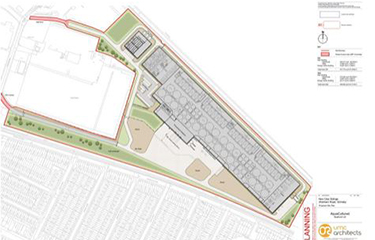A London, England-based start-up is planning a 5,000-metric-ton land-based Atlantic salmon farm in the historic fishing town of Grimsby, U.K., which currently serves as the U.K.’s major seafood-processing hub.
Dubbed the New Clee Aquaculture Facility, the 40,000-square-meter development will include a recirculating aquaculture system (RAS) farm, an integrated processing unit, a water treatment plant, and a feed storage unit. It will be built on undeveloped land previously used as rail sidings.
The facility will house freshwater tanks for the early life-cycle stages, and sea-water tanks to take the fish from their smolt stage through to market-ready fish weighing four to five kilograms. Total water usage will be approximately 1,000 cubic meters of fresh water and 1,000 cubic meters of salt water, both of which will be extracted from boreholes.
The company, which was incorporated in September 2020,plans to invest GBP 75 million to GBP 100 million (USD 90.2 million to USD 120.3 million, EUR 85.2 million to EUR 113.6 million) to develop the farm over the next two years, a spokesperson for Aquacultured Seafood told SeafoodSource. “The project, which has received excellent support from businesses and politicians, will feature cutting-edge technology and become one of the most environmentally friendly ways of producing nutritious food. It will position the U.K. as a world leader in the modern aquaculture industry,” the spokesperson said.
The plan for the project was officially submitted for initial consideration by the North-East Lincolnshire Council in December 2022 and included a full set of technical assessments relating to potential impacts, plus reports outlining the mitigation measures that will be taken to make the planned facility acceptable to regulators.
The company’s agent, Montagu Evans, argued in its submission to the council that the project would not need an environmental impact assessment (EIA), “based on the assessment that the proposal is unlikely to have significant effects on the environment, taking account of potential mitigation.”
However, the EIA has become an issue for the project’s opponents. Opposition from local residents has focused on ...
Image courtesy of Montagu Evans on behalf of Aquacultured Seafood








